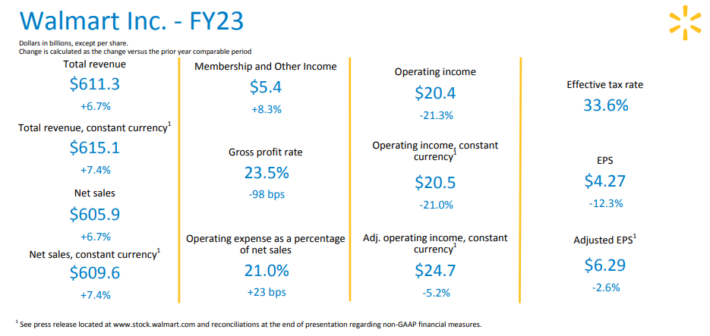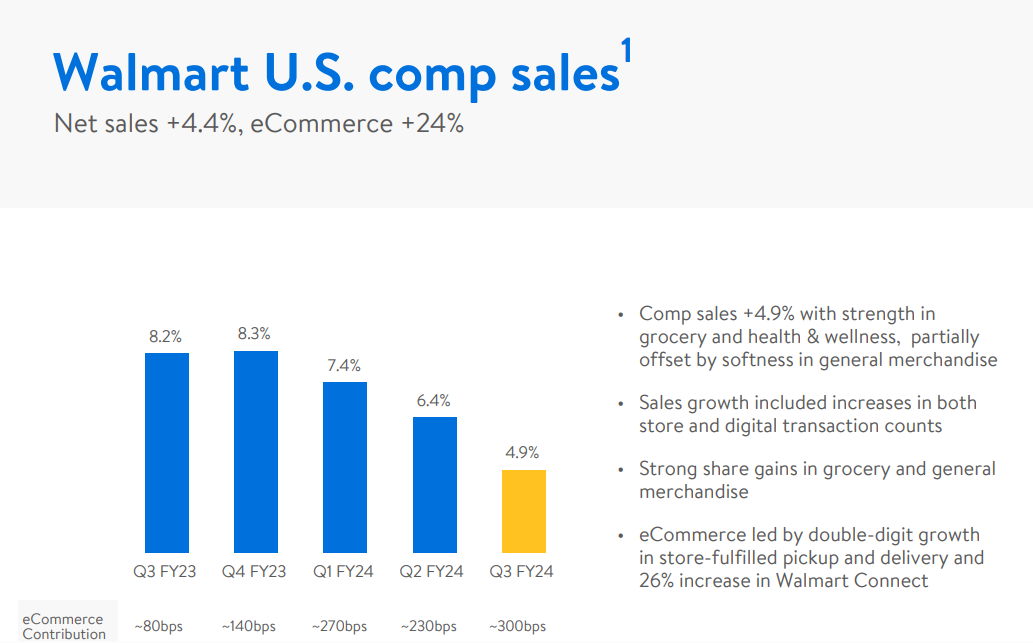Updated on November 27th, 2023
The Dividend Kings are a selective group of stocks that have increased their dividends for at least 50 years in a row. We believe the Dividend Kings are among the highest-quality dividend growth stocks to buy and hold for the long term.
With this in mind, we created a full list of all the Dividend Kings. You can download the full list, along with important financial metrics such as dividend yields and price-to-earnings ratios, by clicking the link below:
Walmart Inc. (WMT) is a Dividend King, and an American retail giant.
Back in 1974, Walmart paid its initial dividend of $0.05 per share, which has been raised annually since for 50 consecutive years, making it a Dividend King. In recent times, various retailers have faced challenges due to competition from internet retail, spearheaded by Amazon (AMZN).
Nevertheless, Walmart has demonstrated its ability to thrive in a rapidly changing environment by adapting. The company has made substantial investments in its e-commerce platform. Unlike many other retailers, Walmart has shown it can compete with Amazon.
This article will discuss the company’s business overview, growth prospects, competitive advantages, and expected returns.
Business Overview
In 1945, Sam Walton opened his first discount store which served as the starting point for what later became known as Walmart. Since then, Walmart has expanded to become the world’s largest retailer, catering to over 230 million customers every week. The company’s revenue exceeded $600 billion in 2022 and its market capitalization is approximately $4201 billion.
As one of the most prominent employers globally, Walmart has a workforce of about 2.3 million people.
Source: Investor Presentation
Walmart has also expanded into a variety of different services, making it a true conglomerate. The Walmart U.S. segment includes retail stores in all 50 U.S. states, Washington D.C., and Puerto Rico. It also includes Walmart’s digital business. Walmart International consists of operations in 25 countries outside of the U.S.
Lastly, Sam’s Club consists of membership-only warehouse clubs and operates in 48 states in the U.S. and in Puerto Rico.
Growth Prospects
Walmart posted third quarter earnings on November 16th, 2023, and results were better than expected on both the top and bottom lines. Adjusted earnings-per-share came to $1.53, which was a penny ahead of estimates. Revenue was up 5.2% year-over-year to $160.8 billion, and was $2.26 billion better than expected.
US comparable sales were up 4.9% year-over-year, which was 150bps better than expected.
Source: Investor Presentation
Transactions rose 3.4%, while average ticket rose 1.5%. E-commerce contribution to comparable sales was down 300bps.
Gross margins were up fractionally, rising 32bps. Consolidated operating expenses as a percentage of sales rose 37bps, offsetting the rise in gross margins. Operating income was up 3% year-over-year on an adjusted basis. Walmart ended the quarter with net cash of $12.2 billion, and total debt of $55.4 billion.
Free cash flow was $4.3 billion, up from $3.6 billion a year ago. We have updated our estimate to $6.50 in earnings-per-share after Q3 results. We currently forecast Walmart to grow its earnings-per-share by 8% per year over the next five years.
Competitive Advantages & Recession Performance
Walmart’s primary competitive advantage is its extensive scale, enabling it to maintain low transportation costs and high distribution efficiencies. Consequently, the company can pass on these savings to customers through affordable prices, contributing to its everyday low prices strategy.
Advertising is another strength of Walmart that helps maintain its brand recognition. The company’s vast financial resources allow it to invest billions of dollars each year in advertising.
Moreover, Walmart’s competitive advantage ensures consistent profitability, even during economic recessions. The company performed remarkably well during the Great Recession, highlighting the resilience of its business model.
It steadily grew earnings-per-share each year in that time:
- 2007 earnings-per-share of $3.16
- 2008 earnings-per-share of $3.42 (8.2% increase)
- 2009 earnings-per-share of $3.66 (7% increase)
- 2010 earnings-per-share of $4.07 (11% increase)
Despite the economic recession being one of the most severe in decades, Walmart’s performance was commendable. The company managed to deliver robust results even during the coronavirus pandemic that led to a recession in the U.S.
Walmart’s growth trajectory indicates that the company could potentially gain from recessions. As a retail leader offering low-cost products, Walmart may experience a surge in traffic during economic downturns, as consumers scale back from pricier retailers.
Valuation & Expected Total Returns
Walmart shares currently trade at a price of ~$157. Using our earnings-per-share estimate of $6.50 for the current fiscal year, the stock has a price-to-earnings ratio of 24.1x. This is slightly above out fair value estimate P/E ratio of 21x. Investors should also note that retailers have typically not held P/E multiples above 20.
If the valuation multiple were to revert to our fair value estimate in the next five years, the company’s total returns would see annual returns decline by 2.7% per year. Walmart shares have performed well for an extended period. While this has rewarded shareholders with strong returns, we view Walmart as a slightly overvalued stock right now.
Aside from changes in the P/E multiple, Walmart should also generate returns from earnings growth and dividends. A projection of expected returns is below:
- 8.0% earnings-per-share growth
- 1.4% dividend yield
- -2.7% multiple reversion
In this scenario, Walmart is projected to generate a total return of 6.7% per year over the next five years.
Final Thoughts
While many retailers have struggled with adapting to the change in commerce shopping habits, Walmart has made the proper strategic investments. The company’s impressive e-commerce growth is reflective of this view.
The company has performed well by generating approximately 12% annualized total returns in the past five years. We find the company’s dividend track record to be impressive, even if the most recent dividend hikes were on the small side.
Walmart is a safe, defensive stock in times of economic hardship, but the modest total return profile prevents it from being a buy today. As a result, we rate it a hold.
The following articles contain stocks with very long dividend or corporate histories, ripe for selection for dividend growth investors:
- The High Dividend Stocks List: stocks that appeal to investors interested in the highest yields of 5% or more.
- The Monthly Dividend Stocks List: stocks that pay dividends every month, for 12 dividend payments per year.
- The Dividend Champions List: stocks that have increased their dividends for 25+ consecutive years.
Note: Not all Dividend Champions are Dividend Aristocrats because Dividend Aristocrats have additional requirements like being in The S&P 500. - The Dividend Contenders List: 10-24 consecutive years of dividend increases.
- The Dividend Challengers List: 5-9 consecutive years of dividend increases.
- The Best DRIP Stocks: The top 15 Dividend Aristocrats with no-fee dividend reinvestment plans.
- The Complete List of Russell 2000 Stocks
- The Complete List of NASDAQ-100 Stocks


